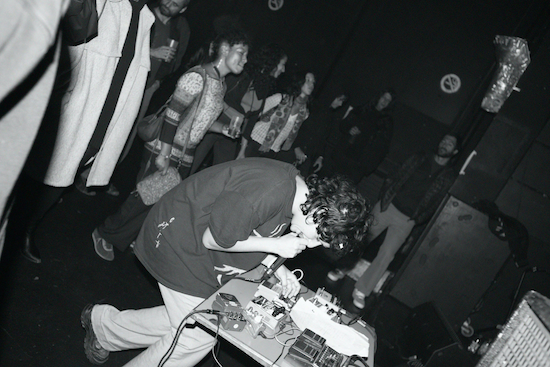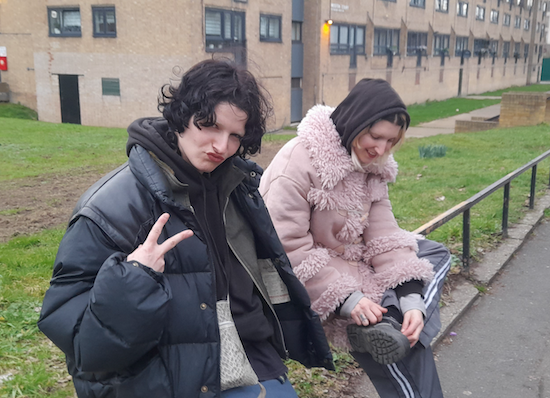Photos courtesy of Donna Candy
One highlight on the bill at this year’s Counterflows Festival – which returns to several venues across Glasgow next month, is the French trio Donna Candy, whose brutal, bewildering experimental rock recalls the austere physicality of early Om. Over simple, repetitive bass and drum arrangements, vocalist Nadja Meier’s performances are warped through a raft of live effects, most frequently a coruscating, ‘chipmunked’ tone. On the Friday of Counterflows, 6 April, the band release their debut album Blooming: a work of crushing physicality, but also gleeful eccentricity. “The first idea was to make something intense and cathartic,” bassist Js Donny tells me of the project’s foundations. “The second idea was to make something fun.”
Donna Candy formed in Marseilles in 2020, bonding through a shared appreciation of French experimental labels such as Desastre and Standard In-Fi. They recall being particularly struck by Standard In-Fi stalwarts France: another trio, comprising bass, drums and hurdy-gurdy, which Donny likens to the music of Tony Conrad. “They have a way of mixing traditional music and experimental rock” Donny tells me. “We feel close to what they’re doing.”
This points to a similar duality in Blooming: though rich in cold, alien sounds, its heavy bass and live drum arrangements indicate a fondness for more familiar shades of heavy rock. Speaking on Donna Candy’s straddling of these worlds, Donny points to an ethos of inclusivity present in experimental music communities, compared to their experiences of metal and hardcore. “Those fields can be so masculine,” they suggest, yielding traditions Donna Candy find themselves unable to uphold in any straightforward manner. “We aren’t fully represented by previous things, so we have to do our own thing.”
This subversive impulse is reflected in Meier’s use of live vocal effects, typically adopting a high-pitched, rippling tone which might be likened helpfully – if perhaps impolitely – to a cartoon character speaking underwater. “I never learned to play an instrument, so it’s an easier way to make music” they explain. Their interest in effects, as a means of achieving new sonic climes with their voice, was influenced by experiences seeing heavy rock groups. “Sometimes I’d see a band live, and I’d just have a look at their pedalboards.”
Meier’s use of vocal effects throughout Blooming speaks to an impulsive, playful desire to inhabit other roles. “I can present a lot of characters at the same time,” Meier explains. This is demonstrated in album-highlight ‘She Danced That Night With The Mare And She Kissed The Yellow Teeth’, their voice rapidly rising and plunging, giving the impression of several distinct perspectives. The ultimate effect is one of alien elasticity: for a thrilling moment in ‘Beez’, Meier’s voice seems to melt and merge with Donny’s rapidly oscillating bass. This points to the instrumental setting of the voice throughout Blooming, furthered by Meier’s preference for writing lyrics in English rather than their native French. “I can’t sing in French because I’m too focused on the meanings of the words. In English, I can focus on their sounds.”

However, there is a defined lyrical palette in Blooming. ‘She Danced That Night With The Mare And She Kissed The Yellow Teeth’ repurposes sentences from French author Jean Giono’s novels Second Harvest and The Song Of The World. Rich in portrayals of love and the countryside, this source material points to Blooming’s wider interest in intimacy – the blistering ‘H4T’ tells of a “smoky kiss, warmer than this roof slab” – and natural imagery. “The lyrics talk a lot about animals and nature” Meier explains. “Going through the sensation of a flower or an animal, you can change your scale of vision of the world.”
While these themes might seem unlikely, given Blooming’s Chat Pile-esque levels of sonic brutality, the group sees them as closely interweaved. “In the music, we are really trying to tell a story through the sensation of sound” Donny explains. “As humans, we are always trying to explain ourselves through words and the intellect – this project is something intuitive and instinctive.” Meier’s vocal performances are ferocious, which might be read as attempts to reach a more primal, animalistic state. It also reflects a broader philosophy in Blooming: a subversion of heavy rock music’s connotations to aggression, in service to simple, unpretentious fun. “We don’t want to shock you or make you uncomfortable – we just want to present something intense,” Donny explains.
This informs Blooming’s use of simplistic, repetitive, hypnotic arrangements. “We don’t want to make complicated music,” Donny says. “We like when it’s easy to play, and we’re able to really express it live. You don’t have to play amazingly technically to convey feelings.” These arrangements are also influenced by the members’ appreciation of dance music. “When I’m at a rave, I like to be surprised by a sound. I like when something is very repetitive, but it changes a bit – there is some glitch in the music,” they explain. This informs moments such as the textural changes undergone by the bass groove in ‘Beez’, and the surprise tempo shift in ‘She Danced That Night With The Mare And She Kissed The Yellow Teeth’: wrong-footing the listener with a sudden, theatrical change to half-speed.
Blooming’s most interesting structural decision comes in the closing tracks ‘Dizzy Break Part 1’ and ‘Dizzy Break Part 2’. Initially conceived as a bridging track for live shows, the former sees Donna Candy adopt a sparser setting. Single bass notes linger over a low-tempo kick and snare beat, as Meier whispers, snarls and screams lyrics which are then replicated on the urgent, muscular closing track ‘Dizzy Break Part 2’. It lays bare Donna Candy’s individual elements, like the bones of an animal, before presenting the sonic extremes these elements can achieve. “It’s about my uncle. He makes wine in the South of France, in a big house in the countryside,” Meier grins, revealing that – even here – Blooming retains its sentimental, pastoral streak. “The sun is really warm, and the ground is red and dry. It’s about this man, this house and the wine.”
Donna Candy’s live shows see them perform off-stage in the middle of the room, surrounded by the audience. “Sometimes I worry,” Donny laughs. “At one of our shows in Brussels, people were falling into us,” breaking the table supporting Meier’s effects pedals. However, the band do not see a raucous crowd as the ultimate sign that they’ve connected with the room. “I’d like people to lose their minds and share something together,” Donny adds, “but sometimes you just want to listen to extreme music, and not be in movement.”
Following a recent string of UK tour dates, Donna Candy’s set on the closing night of Counterflows marks their first appearance in Scotland. Performing aboard The Ferry, a former passenger boat moored on the River Clyde, the show takes place two days after Blooming’s release. It also comes with a line-up change, following the arrival of new drummer Daniel Dariel. “We’ve asked for huge amps” Donny says of the show, hoping to give the album a larger-than-life first outing here.
While Blooming is a work of tremendous intensity, part of its magnetism lies in its eccentricity. Shaping its embrace of volume, vocal experiments and hypnotic arrangements is a desire to express the simple, essential joyfulness of heavy music. “We are not really extroverted, but we love to have fun” Donny says simply, with similarly straightforward hopes for the album’s first appearances live. “I would love to see people enjoying it, and dancing.”


